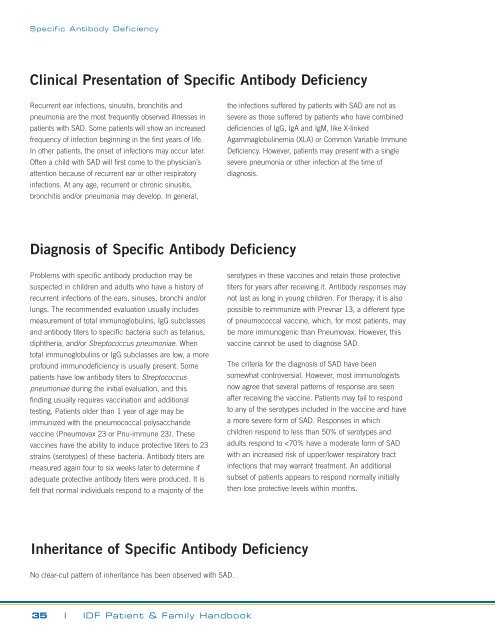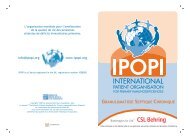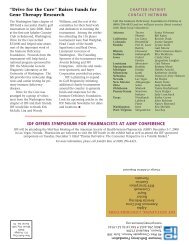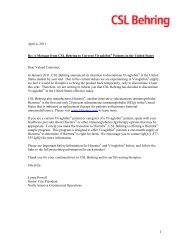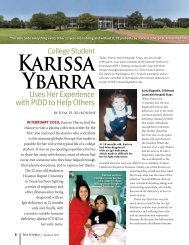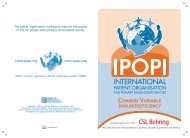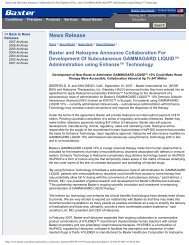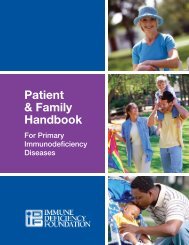Specific Antibody Deficiency
Specific Antibody Deficiency
Specific Antibody Deficiency
- No tags were found...
Create successful ePaper yourself
Turn your PDF publications into a flip-book with our unique Google optimized e-Paper software.
<strong>Specific</strong> <strong>Antibody</strong> <strong>Deficiency</strong>Clinical Presentation of <strong>Specific</strong> <strong>Antibody</strong> <strong>Deficiency</strong>Recurrent ear infections, sinusitis, bronchitis andpneumonia are the most frequently observed illnesses inpatients with SAD. Some patients will show an increasedfrequency of infection beginning in the first years of life.In other patients, the onset of infections may occur later.Often a child with SAD will first come to the physician’sattention because of recurrent ear or other respiratoryinfections. At any age, recurrent or chronic sinusitis,bronchitis and/or pneumonia may develop. In general,the infections suffered by patients with SAD are not assevere as those suffered by patients who have combineddeficiencies of IgG, IgA and IgM, like X-linkedAgammaglobulinemia (XLA) or Common Variable Immune<strong>Deficiency</strong>. However, patients may present with a singlesevere pneumonia or other infection at the time ofdiagnosis.Diagnosis of <strong>Specific</strong> <strong>Antibody</strong> <strong>Deficiency</strong>Problems with specific antibody production may besuspected in children and adults who have a history ofrecurrent infections of the ears, sinuses, bronchi and/orlungs. The recommended evaluation usually includesmeasurement of total immunoglobulins, IgG subclassesand antibody titers to specific bacteria such as tetanus,diphtheria, and/or Streptococcus pneumoniae. Whentotal immunoglobulins or IgG subclasses are low, a moreprofound immunodeficiency is usually present. Somepatients have low antibody titers to Streptococcuspneumoniae during the initial evaluation, and thisfinding usually requires vaccination and additionaltesting. Patients older than 1 year of age may beimmunized with the pneumococcal polysaccharidevaccine (Pneumovax 23 or Pnu-immune 23). Thesevaccines have the ability to induce protective titers to 23strains (serotypes) of these bacteria. <strong>Antibody</strong> titers aremeasured again four to six weeks later to determine ifadequate protective antibody titers were produced. It isfelt that normal individuals respond to a majority of theserotypes in these vaccines and retain those protectivetiters for years after receiving it. <strong>Antibody</strong> responses maynot last as long in young children. For therapy, it is alsopossible to reimmunize with Prevnar 13, a different typeof pneumococcal vaccine, which, for most patients, maybe more immunogenic than Pneumovax. However, thisvaccine cannot be used to diagnose SAD.The criteria for the diagnosis of SAD have beensomewhat controversial. However, most immunologistsnow agree that several patterns of response are seenafter receiving the vaccine. Patients may fail to respondto any of the serotypes included in the vaccine and havea more severe form of SAD. Responses in whichchildren respond to less than 50% of serotypes andadults respond to


